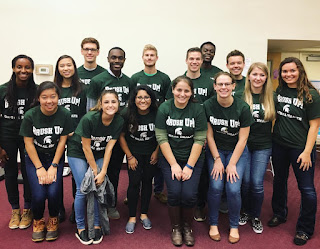Admissions Office Hosts First Facebook Live Discussion, Q&A; More Sessions to Come
The College of Human Medicine (CHM) Office of Admissions used Facebook Live to hold the department's first stream this week. Admissions staff used the live broadcast to connect with potential applicants and thoroughly discuss the medical school application process, from A to Z. Elizabeth Lyons, Admissions Counselor, detailed the different phases of the application and also offered tips and advice for students who may potentially apply to medical school. Along with providing that overview, Elizabeth also talked about factors that make applicants competitive and traits that sit well with the College of Human Medicine, in particular. Joined by Francisco Velazquez, Communications Coordinator, the staff members also facilitated a quick Q&A. The Office of Admissions had asked Facebook and Twitter followers to submit questions for a week prior to the stream. The team also announced that they will be going "live" again in the new year. Follow the Office of Admissio...





